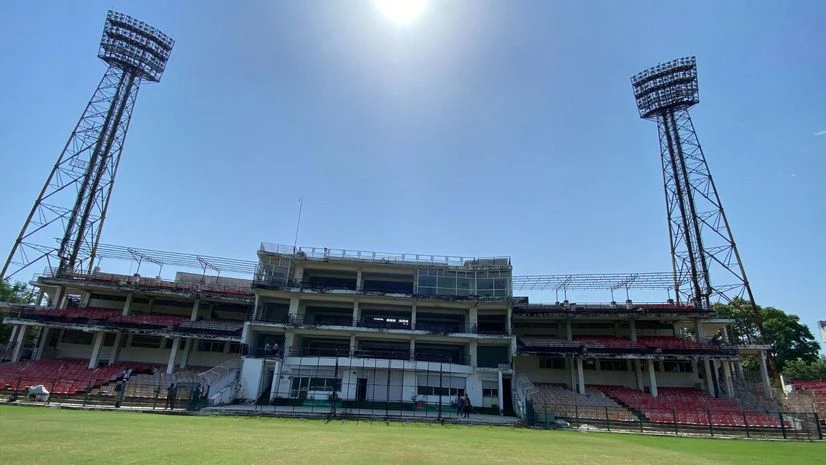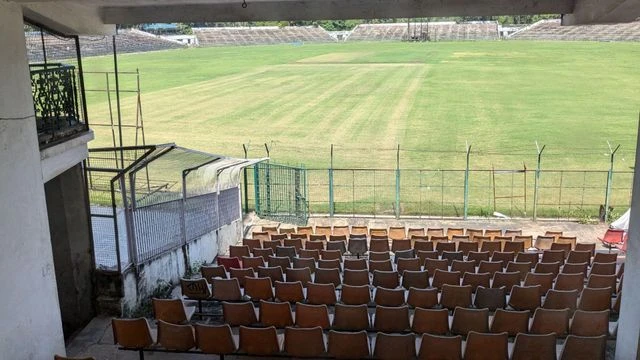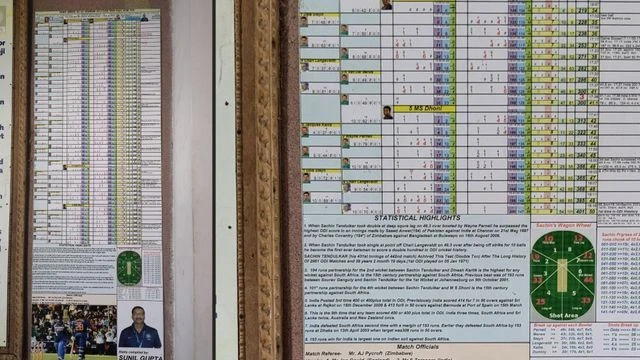)
Sachin Tendulkar scored first-ever double hundred at Roop Singh Stadium, Gwalior on February 24, 2010. Photo: Anish Kumar
The Captain Roop Singh Stadium holds a significant place in the annals of Indian sports.
Located in the heart of Gwalior, the stadium is named after Captain Roop Singh, the brother of the legendary hockey player Dhyan Chand.
Click here to connect with us on WhatsApp
Roop Singh was a member of British India’s hockey team that won gold medals at the 1932 and 1936 Olympic Games.
Initially a hockey stadium, the Captain Roop Singh Stadium in Gwalior was converted into a cricket venue in 1988.
Its historical significance grew when, on February 24, 2010, Sachin Tendulkar made history by becoming the first cricketer to score a double century in an ODI at the very same venue.
Captain Roop Singh Stadium Cricket Stats
However, the legacy of Captain Roop Singh Stadium is not limited to Tendulkar and Roop Singh. After its conversion into a cricket stadium under the guidance of Maharaja Madhavrao Scindia, the venue has hosted several international matches, including the highly anticipated 1996 clash between India and the West Indies. That match was viewed as a contest between Tendulkar and Brian Lara.
Lara was dismissed for just two runs in that game, as the combined efforts of Manoj Prabhakar, Javagal Srinath, and Anil Kumble limited the West Indies to a modest total of 173 runs. Tendulkar, however, scored a match-winning 70 runs off 91 balls before being run out. India went on to win the match by five wickets.
)
Roop Singh Stadium view from India dressing room during India vs South Africa ODI match on February 24, 2010. Photo: Anish Kumar
India has played 10 matches at Captain Roop Singh Stadium, winning eight of them. India’s first defeat at this venue came against the West Indies in 1988. The second loss occurred a decade later, on May 28, 1998, when Kenya triumphed over India in the Coca-Cola Triangular Series.
Interestingly, Sachin Tendulkar, who would score the first-ever double-century at the same venue 12 years later, was part of India’s playing XI in that match but managed only 18 runs off 25 balls.
|
ODI match results at Captain Roop Singh Stadium, Gwalior |
|||||
|
Team 1 |
Team 2 |
Winner |
Margin |
Ground |
Match Date |
|
India |
South Africa |
India |
153 runs |
Gwalior |
24-Feb-10 |
|
India |
Pakistan |
India |
6 wickets |
Gwalior |
15-Nov-07 |
|
India |
Australia |
India |
37 runs |
Gwalior |
26-Oct-03 |
|
India |
New Zealand |
India |
14 runs |
Gwalior |
11-Nov-99 |
|
India |
Kenya |
Kenya |
69 runs |
Gwalior |
28-May-98 |
|
Pakistan |
Sri Lanka |
Pakistan |
30 runs |
Gwalior |
12-May-97 |
|
India |
West Indies |
India |
5 wickets |
Gwalior |
21-Feb-96 |
|
India |
England |
India |
4 wickets |
Gwalior |
5-Mar-93 |
|
India |
England |
India |
3 wickets |
Gwalior |
4-Mar-93 |
|
India |
South Africa |
India |
38 runs |
Gwalior |
12-Nov-91 |
|
England |
West Indies |
West Indies |
26 runs |
Gwalior |
27-Oct-89 |
|
India |
West Indies |
West Indies |
73 runs |
Gwalior |
22-Jan-88 |
When Sachin Tendulkar Made History
Highest run-scorer at Roop Singh Stadium
|
Most runs in ODIs at Captain Roop Singh Stadium, Gwalior |
||||||||||||
|
Player |
Span |
Mat |
Not out |
Runs |
HS |
Ave |
BF |
SR |
100 |
50 |
4s |
6s |
|
Sachin Tendulkar (IND) |
1991-2010 |
9 |
1 |
529 |
200* |
66.12 |
551 |
96 |
2 |
2 |
63 |
5 |
|
RA Smith (ENG) |
1989-1993 |
3 |
– |
266 |
129 |
88.66 |
325 |
81.84 |
1 |
2 |
26 |
6 |
|
M Azharuddin (IND) |
1988-1998 |
6 |
1 |
252 |
95* |
50.4 |
258 |
97.67 |
– |
2 |
28 |
2 |
|
Navjot Singh Sidhu (IND) |
1991-1998 |
5 |
1 |
242 |
134* |
60.5 |
323 |
74.92 |
1 |
1 |
23 |
1 |
|
Sourav Ganguly (IND) |
1999-2007 |
2 |
1 |
158 |
153* |
158 |
155 |
101.93 |
1 |
– |
19 |
3 |
|
DL Haynes (WI) |
1988-1989 |
2 |
1 |
143 |
138* |
143 |
179 |
79.88 |
1 |
– |
12 |
2 |
|
GA Hick (ENG) |
1993-1993 |
2 |
1 |
123 |
105* |
123 |
134 |
91.79 |
1 |
– |
8 |
2 |
|
RB Richardson (WI) |
1988-1996 |
3 |
– |
121 |
47 |
40.33 |
165 |
73.33 |
– |
– |
12 |
0 |
|
AB de Villiers (SA) |
2010-2010 |
1 |
1 |
114 |
114* |
0 |
101 |
112.87 |
1 |
– |
13 |
2 |
|
Carl Hooper (WI) |
1988-1988 |
1 |
1 |
113 |
113* |
0 |
97 |
116.49 |
1 |
– |
12 |
2 |
|
MS Dhoni (IND) |
2007-2010 |
2 |
2 |
113 |
68* |
0 |
80 |
141.25 |
– |
1 |
10 |
5 |
Sachin’s double century: A lasting legacy at Roop Singh Stadium
Fast forward to the present day, when Business Standard visited Captain Roop Singh Stadium ahead of the India vs Bangladesh first T20 match – to be hosted at the newly built Shrimant Madhavrao Scindia Stadium on the outskirts of the city – the entrance of the historic stadium resembled a movie theatre. However, the legacy of Sachin Tendulkar’s 200 runs was still prominently displayed in the reception area.
The reception area continues to showcase the complete scoresheet of the India vs South Africa match. Sunil Gupta, the scorer of that game, proudly displayed the scoresheet, recalling how the crowd’s frustration with MS Dhoni, India’s then-captain, grew as Tendulkar neared his milestone.
Gupta explained, “Sachin was on 186 in the 43rd over when he suddenly slowed down, and MS Dhoni began hitting big shots. In the 49th over, Dhoni faced all six deliveries, only taking a single off the last ball. Everyone was wondering what he was doing.”
)
Scoresheet of India vs South Africa ODI match on February 24, 2010 when Sachin Tendulkar scored first-ever 200 runs in Test cricket history. Photo: Anish Kumar
“I was literally shouting, ‘Please let him score one run.’ That was the only time I felt biased. Dhoni hit a six on the first ball of the last over, but the crowd remained silent. When he took a single off the second ball, the stadium erupted. Then, on the third ball of the 50th over, Sachin reached the milestone. There were tears in our eyes – probably the last time I cried,” Gupta added.
Gupta further mentioned that the stadium’s giant scoreboard remained untouched after Sachin’s historic achievement. Unfortunately, harsh weather conditions have since damaged the scoreboard, causing the names and scores to fade away.
The Gwalior Division Cricket Association owns the Captain Roop Singh Stadium, which is currently leased to the Madhya Pradesh Cricket Association (MPCA), with the lease expiring in 2025.
Gupta expressed hope that if the MPCA renews the lease, they will restore the deteriorating stadium and potentially convert it into a museum dedicated to Sachin Tendulkar’s unbeaten 200 runs.
First Published: Oct 04 2024 | 3:48 PM IST


































